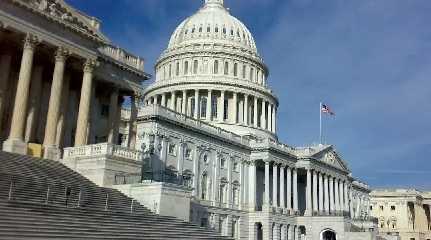
WASHINGTON, May 24 (Reuters) - Democratic President Joe Biden and top congressional Republican Kevin McCarthy's negotiators held what the White House called productive talks on Wednesday to try to close a deal to raise the United States' $31.4 trillion debt ceiling and avoid a catastrophic default.
Time is running short, as the Treasury Department has warned the federal government could be unable to pay all its bills by as soon as June 1 - just eight days away - and it will take several days to pass legislation through the narrowly divided Congress.
U.S. bond giant PIMCO said it believed negotiators needed to strike a deal by the middle of this week to make that deadline.
Biden and McCarthy, the speaker of the House of Representatives, remain divided on how to move forward.
But White House spokesperson Karine Jean-Pierre said talks remain productive.
"If it keeps going in good faith, we can get to an agreement here," she said at a briefing.
McCarthy told reporters on Wednesday that any deal must cut discretionary spending, not hold it steady as Biden has proposed, and not raise taxes.
"I'm sending our negotiation team down to the White House to try to finish up the negotiations," McCarthy said. "The off ramp here is to solve the problem - to spend less than we spent last year. That's not that difficult."
He said he believed the two sides would reach a deal and avoid default.
Any deal that Biden and McCarthy reach will have a narrow path for passage through the divided Congress, where McCarthy's Republicans hold a 222-213 House majority and Biden's Democrats control the Senate by a 51-49 margin.
The compromises needed to win both chambers' approval will also cost each party some votes from its most partisan members.
The lack of progress has heightened concerns that Congress could inadvertently trigger a crisis by failing to act in time.
"We're certainly getting to a place that's too close for comfort," said Shai Akabas of the Bipartisan Policy Center, a think tank.
Ratings agency Moody's might change its assessment of U.S. debt if lawmakers indicate a default is expected. Moody's currently has a top-notch "Aaa" rating for U.S. debt, while rival rating agency S&P Global lowered its rating following a 2011 debt-ceiling showdown. A lower rating could push up borrowing costs.
STOCKS SLIDE
The months-long standoff has spooked Wall Street, weighing on U.S. stocks and pushing the nation's cost of borrowing higher.
Treasury Secretary Janet Yellen on Wednesday said the United States will be unable to pay all its bills by early June, adding that it is difficult to be precise about the specific day the government will run out of resources.
That would trigger a Wall Street meltdown and push the U.S. economy toward recession, with the default also hitting regular Americans, economists say. Medical providers that rely on government payments could be among the first to feel the heat.
Republicans want to cut discretionary spending for the 2024 fiscal year beginning in October by roughly 8%, while Democrats have pushed to hold it steady at this year's rate.
Negotiators differ over Republicans' proposals to impose new work requirements on benefits programs for low-income Americans and loosen energy permitting rules.
The White House has offered to limit discretionary spending for the coming two years, in line with previous bipartisan budget agreements. Republicans have offered spending caps for the coming six years.
Republicans have rejected White House proposals to set a minimum tax on corporations and billionaires, cancel subsidies for oil and gas producers, and broaden the government's ability to negotiate lower prices for prescription drugs, according to Democratic Representative Pramila Jayapal, who leads the 101-member Congressional Progressive Caucus.
Congress regularly needs to raise the nation's self-imposed debt limit to cover the cost of spending and tax cuts it has already approved.
Each party faces opposition to the talks from within, with hardline Republicans insisting on the sharp spending cuts they passed in a House bill last month and progressive Democrats opposed to spending cuts or new work requirements.
Biden spent months saying he would not negotiate on raising the debt limit only to reverse course and begin talks with McCarthy in the last few weeks.




